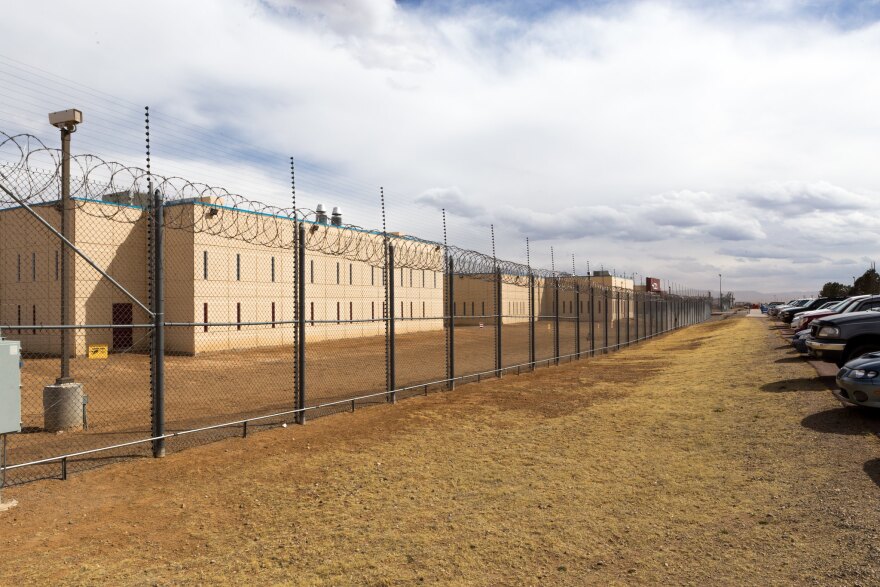The American Civil Liberties Union of New Mexico filed a second lawsuit Monday, July 29, on behalf of a woman who says she was subject to repeated sexual abuse from a corrections officer while she was in the Springer prison. The lawsuit says her complaints weren’t taken seriously by prison administration, and the accused officer maintains his job and position today.
KUNM spoke with lawyer Lalita Moskowitz about the power prison guards have, and how people in prison often fear retaliation for reporting sexual abuse and harassment.
LALITA MOSKOWITZ: Everything that you need as a person who’s incarcerated, it has to happen through officers. So when you need medication, when you need food.
And supervisors—so employment supervisors—have power over whether people can be employed, but also this comes up a lot, where they have power to say “This person’s not doing what they’re supposed to do in their job,” and so they can take away their good-time credits.
What taking away good-time means is that somebody has to stay in prison for longer. And so that’s really significant, and maybe something that doesn’t sort of immediately occur to folks is that somebody can actually extend their incarceration.
What are the allegations in this lawsuit about how this correctional officer abused that kind of power?
MOSKOWITZ: In a number of ways. I don’t want to use the word “common,” but I think sort of as women, we’ve all experienced some sexual harassment. And when you think about workplace sexual harassment, it started a little bit like that—really inappropriate vulgar comments, continuing on with these threats. He sort of could say to her “Don’t report what I’m doing. Don’t report me. Or I can take away your good time.” And you have an environment where officers are much more likely to believe each other than they are to believe the women who are in prison there.
The lawsuit says the situation escalated. So what does the person bringing this case say the fallout or the impacts were for her?
MOSKOWITZ: For one thing she felt really unsafe while all this was going on in her workplace. And just that constant fear of: What’s he going to do?
She started having really severe insomnia and anxiety. Even after she reported, he was still there. Then she had to hear about other women going through the same and more, and so it caused her really severe depression as well.
What are specific things that the state’s Department of Corrections should change to make the situation better for women in the prison system?
MOSKOWITZ: Right now, particularly with the culture and climate the way it is in the prisons, it’s incredibly difficult for women to come forward and report. There’s all of this retaliation that happens. And then you have to live in an environment where your abuser still is. You can’t escape it at all.
And so when women have the immense courage to be able to come forward, the first thing the department can do is take it seriously, investigate, don’t allow those officers to remain in these positions of power. In addition, creating environments where officers don’t feel like they can get away with this kind of thing, not having so many one-on-one situations, as a starting point for some of the stuff that they could do.
Do you think that the new Department of Corrections Secretary Alisha Tafoya Lucero might work on making some of these changes?
MOSKOWITZ: We really hope so. As an office, the ACLU is hopeful that we can talk with this administration, work with the administration, to make positive change. It’s hard to know, but we’re really hopeful that she’ll be open to that.
The number of women incarcerated in New Mexico has been rising steadily over the last decade, and the women’s prisons are overcrowded and understaffed—according to lawsuits, and news reports and accounts from people who did time. Do you think those are factors in these sexual assault and harassment encounters?
MOSKOWITZ: Yes, I think that’s absolutely a component of this. I hear all the time from clients who are in the prisons that if there is understaffing, there aren’t guards who can supervise different kinds of things. A lot can sort of go under the radar in different ways. And it can be really unsafe when there’s somebody in need and there’s not a guard, or there’s one guard for however many folks, and somebody needs help.
We’re really hoping that some change that will come in the next couple of years will incarcerate less people.
This is the second lawsuit like this that the ACLU has filed in New Mexico. Is there going to be more?
MOSKOWITZ: Yes, this is the second of at least three that we anticipate filing. It’s hard to say if other things will come forward. But of course there’s other lawsuits going on, which I think, really demonstrates how pervasive this problem is.
*****
A spokesperson for the state said they can’t comment on a pending lawsuit, but that the Corrections Department takes every allegation of sexual abuse seriously and conducts thorough investigations.





